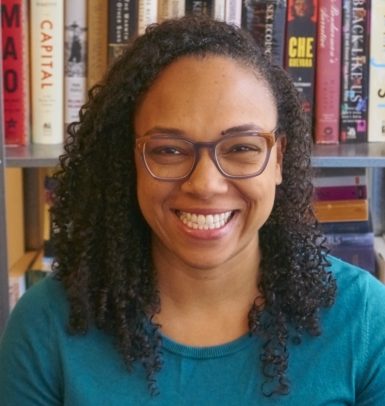UIC sociologist’s book highlights political, social change among blacks, Latinos in Southeast

Efforts to “repel” Latino immigrants and the fear of a new minority-majority, particularly in the Southeast, has played an unintended role in forging a new set of positive and collaborative relationships between blacks and Latinos, according to a recent book from UIC sociologist Jennifer Jones.
In “The Browning of the New South,” Jones tells the story of political and social change in contemporary Winston-Salem, North Carolina, from the perspective of its new Latino residents.
In what might be considered surprising to some people from other parts of the country, many Latino immigrants have settled in this legendary tobacco industry town, which is now the state’s fourth-largest city.
Much like other cities in this part of the country, Winston-Salem’s demographics shifted in the 1990s and 2000s from a “biracial middle-class town of blacks and whites, to a tri-racial city,” Jones said.
According to Jones, assistant professor of sociology and Latin American and Latino studies, the American South and North Carolina as a whole are not national outliers, but rather a political testing ground.
“Too frequently in the U.S., we dismiss the Southeast as the crucible of racism, religiosity, and conservatism,” she said. “This is problematic not only because it is not true – it is also a crucible of progressive civil rights politics, culture, and opportunity for African-Americans and other non-whites.”
Through visits to community meetings, conversations with residents and scholars, and studying migration patterns, Jones discovered that an expanding base of sustainable coalitions built at the grassroots level have formed around issues such as education, voting rights, health care and policing.
“It required a particular bilingual, bi-cultural vision, a commitment not only to seeing each other as friends and allies, in a shared struggle, but to also act in the capacity,” she said. “This kind of work also suggests that the kinds of shifts we are seeing in the South, the relationships and alliances that are being formed, are not accidents, nor temporary conveniences.”
The experiences of “Latinxs” in America and the South are good examples of how race is a process and how the way groups are racialized shifts over time, she said.
“Often, we assume that the racial categories are static and the kinds of experiences we have as a result of the categories we belong to are fixed. In fact, racial meanings, experiences, and practices change over time, often quickly,” Jones said.
The developments in Winston-Salem allow Jones to provide historical context to the country’s altering approach to immigration policy over the last few decades.
“Historically, immigration has often been used as a political wedge issue, used as a proxy to debate economic issues, issues of social and political rights, and questions of national identity, and has often been decided on the issue of race,” she said. “The moment we are in is no different, even if the desires and efforts of newcomers are the same.”
A book launch event will be held Sept. 19 from 6-7:30 p.m. at Sandymeyer’s Bookstore, 714. S. Dearborn St.
